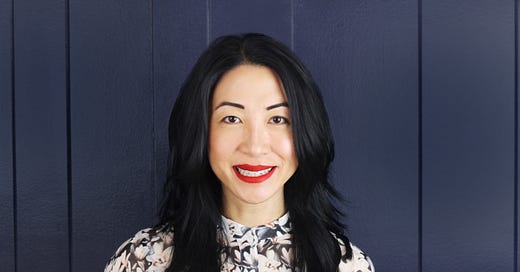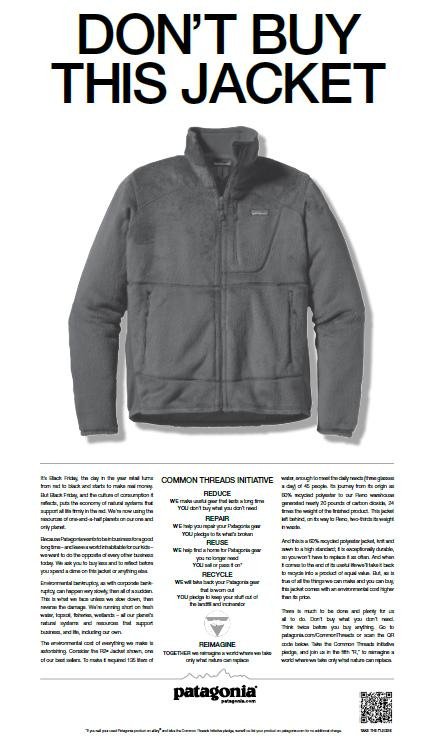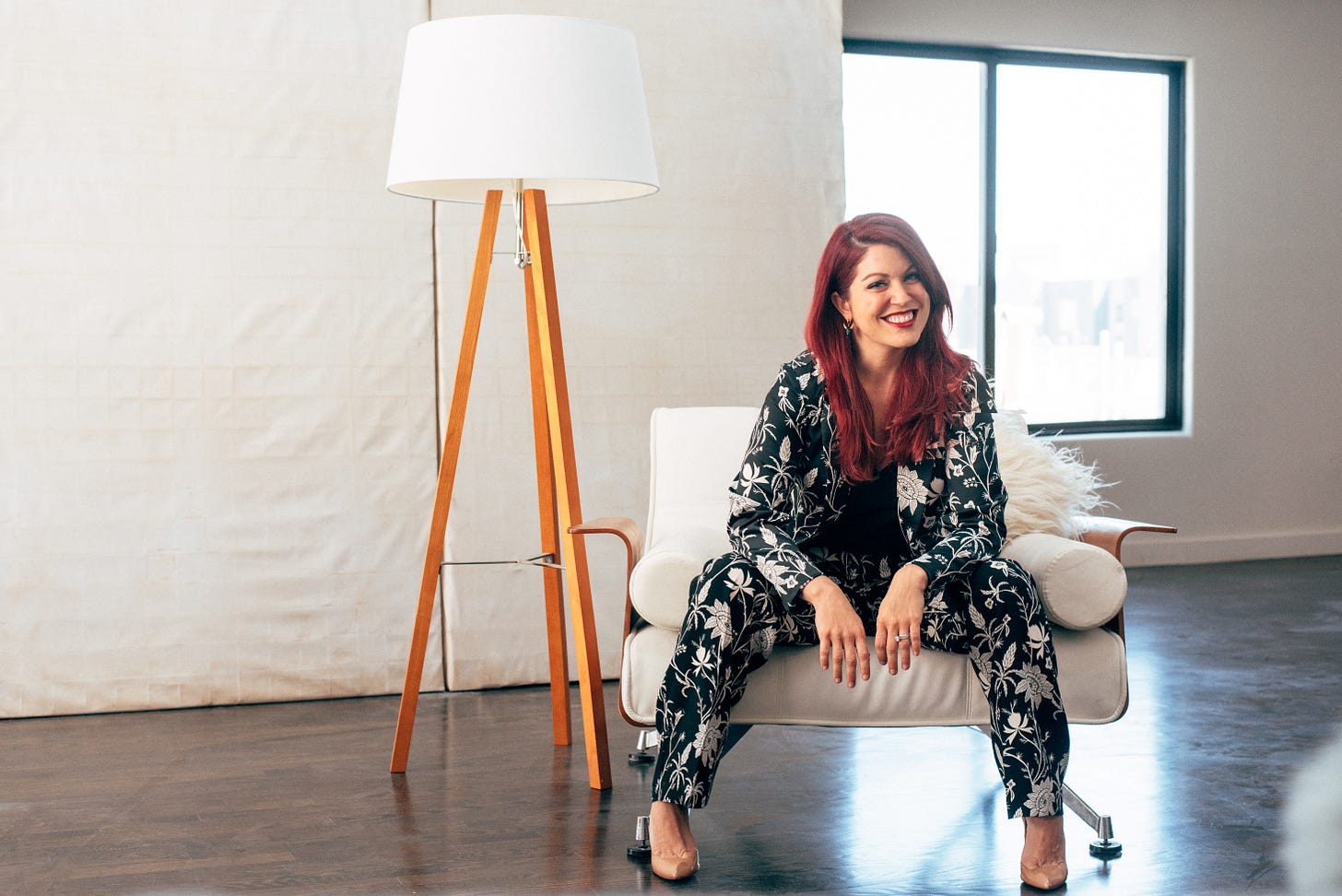👋, I’m Kimberly. I’ve been creating obsession-worthy brands for the past fifteen years. And now, I’m giving away my secrets every week in this newsletter.
Welcome to my new Secrets of… Series
I’ve carefully designed a series of eleven thought-provoking questions to tease the most interesting and insightful information out of the best brand builders in the world.
As part of this new Secrets Of… series, I’ll be interviewing marketers, founders, designers, strategists, photographers, videographers, and more.
It takes a village, and these are our people.
Secrets of… Stephanie Lin
This week, I caught up with one of my favorite marketing minds on the planet—Stephanie Lin.
If you’ve ever used mineral makeup or watched a beauty how-to video on YouTube, you’ll relate to Stephanie’s work. This Harvard MBA spent eleven years developing and growing two cult brands from their beginnings—bareMinerals and ipsy.
Both brands are pioneers in leveraging digital community and content to rapid-scale and differentiate the business.
I worked with Stephanie while she was at ipsy—helping her with their rebrand in 2017 and working on fun marketing initiatives like this super sweet campaign.
And this launch, which involved multiple pink poodles.
Before working in beauty, Stephanie was an investment banker at Goldman Sachs. And now she’s making a difference in the world of finance as Chief Marketing Officer of Empower.
1. How would you explain what you do to someone who has no idea?
I introduce people to products and services that can make a positive and meaningful difference in their lives. I'm a matchmaker.
2. One of my favorite quotes about branding is this one from Wally Olins:
Fundamentally, branding is a manifestation of the human condition. It is about belonging; belonging to a tribe, to a religion, to a family. Branding demonstrates that sense of belonging. It has this function for both people who are part of the same group and also for the people who don’t belong.
What brands have made you feel like you personally belong in your lifetime? These could be brands you belong with right now—or in the past (say, when you were a teenager).
I’m drawn to brands that share my convictions.
Brands that use their platforms and grace to influence their communities and society. Brands that think about things differently. Brands that move the world forward.
The latest brands I find myself drawn to are those that challenge traditional definitions of beauty. Bare Minerals and ipsy both fit in this category.
And the new brand I'm in love with right now in this category is Girlfriend Collective.
I own a few of their pieces. And in terms of the product itself, they're actually not my favorite pieces. I prefer Nike. But, there's just something about their marketing and their visuals that gets me.
I feel like I am not the perfect size and shape that people would consider beautiful in the world. And when I wear Girlfriend Collective’s gear, I love how I feel.
That's amazingly powerful—when the product might not be up to snuff, but the brand makes you feel spectacular.
I also love brands that protect and defend the environment, like Patagonia and Rothys. Every product is held to a superior standard—and it must fit this guideline around protecting and championing the environment.
3. What event or interaction in your life has most shaped who you are today as a marketer?
I didn't go to school for marketing. I didn't take any classes for marketing. I fell into it, and I ended up loving it, but it had a lot to do with the people who trained me on the job.
One of those people is Leslie Blodget, the founder and former CEO of Bare Minerals.
During my first year as a marketer, a team of twenty of us drove over to the Bare Minerals boutique in Corta Madera.
We were all circled around staring at the boutique's window—trying to figure out whether we wanted to go with one creative direction or the other creative direction.
Then Leslie looks over at me, and she says, "What do you think?"
And I honestly did not have a point of view—I was so green. So I paused, trying to come up with something thoughtful to say.
Leslie didn't miss a beat.
She said to me, "You probably have a quarter second to make an impression before that sale walks over ten yards the MAC store. “
And that was the first moment I realized that in the customer journey, there are these very vital touchpoints.
You don't get very many of them.
And if you can't make that instant emotional connection with one visual here or three words there, you’ve lost the relationship.
Being intentional about where those moments happen for a brand and a category is so crucial.
It might not seem like that one sign on that one table would matter so much. But if you as a marketer know what those moments are, you can do a lot of good for the business.
4. What is the marketing-related book you would gift to someone who isn’t in marketing? And what is the non-marketing-related book that’s had the most impact on you as a marketer?
My Marketing-Related Book:
Different: Escaping the Competitive Herd by Youngme Moon
In the book, Youngme discusses how so many brands start out with a very tight concept about who they are, what they do, and who they serve.
But in the quest for growth, they start launching a lot of new products or features. They go after new geographies. They come up with new challenges for their brand. And inevitably, they start to do things that go outside of their core.
They become much more ubiquitous and universal—and they forget to stay loyal to that core, which was the reason for their success in the first place.
If you can continue to stay loyal to who you are, people will stay with you over time.
It's only when you start to lose your way that you lose your early adopters. You lose that heritage that made you so special in the first place.
You try to be everything to everyone, and suddenly you're nothing to no one.
My Non-Marketing-Related Book:
The Life-Changing Magic of Tidying Up by Marie Kondo
During the pandemic, my husband and I went through the whole method. It is so fascinating to watch these very inexplicable attachments that we all feel to stuff.
It made me think about my contribution to over-consumption.
My job is to introduce people to products and services that can make a great difference in their lives.
And I admire brands that have withstood the test of time, not because they're constantly pushing products out—but because the brand is so powerful. It makes people feel like they're part of something bigger.
A great example of a brand like this is Patagonia.
I’ll never forget the campaign where they took out a full-page ad in the New York Times with photography of their latest jacket, and they said, "Do not buy this jacket."
As a marketer, I understand what a glorious PR move this was. It got so much buzz and so much hype.
But as a customer, it really resonated with me that they were so focused on being good stewards of the environment. They were showing that all of us can become much more intentional about what we buy.
They make money; they're a business. But they're doing business with the right values and standards. And it makes us as customers feel good about how they do business. Not too many brands do that.
5. You're getting put into the Marketers Hall of Fame. What campaign do you want to be remembered for? And what campaign do you wish would be forgotten?
My Campaign to Be Remembered For:
bareMinerals “Rethink Going Bare”
BareMinerals had become famous for clean makeup and the idea of "bare skin beauty."
It was 2013, and we were looking to re-promote our foundation category. So we created a whole campaign around rethinking the routine.
We went to market with all these clever, witty, provocative tag lines that were inuendos off of the foundation—like "Rethink Going Bare in Public.” Or because it has good-for-you skincare ingredients and sun protection, "Rethink the Use of Little Protection."
Then we bought out one of the Bart stations in San Francisco—and had billboards surrounding the city. We did the same thing in LA and New York.
The point was to position the brand not just as a beauty brand, but as a brand that could spark conversation.
We had the out-of-home campaign stitched together with a microsite (because microsites were a thing back then! don’t use them now!).
And each day, we featured a hot topic that people sometimes shy away from—with five questions about the topic. You were meant to answer the questions, share them with your friends, and engage in the conversation.
It wasn't just another beauty campaign where it's pretty visuals and that's about it. It went a layer deeper trying to get discussions going.
My Campaign to Be Forgotten:
bareMinerals Anaheim Creator Activation
We were just starting to work with content creators. And we had done a huge brand activation down in Anaheim. The day after, we hosted a meet-up with two extremely well-known teen creators.
The idea was to make a very big splash at the event, where the creators would be, and then do something much more intimate at the boutique, where the creators could bring their fans.
So much work went into the event planning—and Kim, no one showed up!
The boutique was empty. We had double the staff. We had two teenage creators who were so embarrassed to be there standing around. We had podiums for them where they were sitting.
The whole thing was so over the top and fun—and we couldn't get anybody there.
6. What marketing principle do you think great marketers overlook all the time?
Don't sell to yourself.
The truly great marketers can get away with it because they do such a lovely job getting to know their customers. They listen, they understand, and they empathize—to the point where they might not be consumers of the product, but they know their customers so intimately and viscerally that they can get away with selling to themselves.
But it's such a tricky road to go down.
6. What advice would you give your 26-year-old self—both career-related and not career-related?
Career-Related Advice:
Follow your heart, not your brain.
Your brain will trick you into doing things that aren't good for you.
You can over-rationalize stuff—and sometimes it's just what you feel in the pit of your stomach that will lead you in the right direction.
Non-Career-Related Advice:
Let go of things that do not serve you.
If you're an over-thinker like me, you carry stuff with you into the future.
And more often than not, it works against you. It doesn't help you get better or faster.
You just have to learn to pack it away and leave it behind.
7. What’s the most valuable positive feedback you’ve ever been given? And what’s the most valuable negative feedback you’ve ever been given?
Positive Feedback:
You’re really good about leaning into difficult conversations.
I've learned over the years to embrace the discomfort and not let hard feelings fester or let challenging situations prevent me from having more emotional discussions with people if things aren't working well.
It reminds me of that one saying about how marriage is really hard work, and you only get good at it if you put in the time and the energy. I think to some extent that's true with all of your work relationships—with your team, with your boss, with your peers.
I've gotten pretty comfortable talking about emotions and how things are feeling. And it's all in the pursuit of getting to a much better place.
The Negative Feedback
You need to be more more influenceable.
I was told this by a person a few years ago—and I honestly didn't understand what that meant.
I responded, "Oh, you mean I need to be more influential."
And he said, "Oh no, you're influential fine."
I said, "Ok, you need to explain this to me."
He said, "You have such strong beliefs. You're really good about listening, and you're curious to understand. But when there is a difference of opinion, you don't seem to allow yourself to be swayed.”
He continued, “You’re good at getting on board with a decision you don’t agree with once it’s made and we need to move on. But do you know how much better your performance would be if you didn't just disagree and commit—but you disagreed and believed?’
9. What motivates you to get up and go every day?
I'm a big fan of New Year's resolutions—or intentions, as people now call them.
It might sound so cheesy, but I love the idea of a do-over. What gets me up in the mornings is the opportunity to be better than I was yesterday.
Yesterday may not have gone the way you wanted it to. Maybe you fell short of expectations. Maybe things didn't work out.
But in the morning, you get a second chance.
10. Who do you most admire—and what question would you most like to ask them?
I admire all of these young female activists like Greta Thunberg.
They're so motivated and so intelligent. I was not anything like that when I was their age—which is why I'm so impressed with their confidence and determination.
Whether it's climate change or women's rights in other countries, the situations they're working on feel so dire.
And I'm curious—what gives them hope of real change, when the culture and politics and systems are all working against them?
What keeps them going and trusting that all of their work will pay off?
11. Last question—what's your secret?
Just take it bird by bird.
This comes from the writer Amy Lamont.
She tells the story of how her brother procrastinated on his summer project until the very last day when it was due.
The project was to draw a bunch of birds—hundreds and hundreds of birds. So he was sitting down with his sketch paper and pen in hand trying to get started and feeling so overwhelmed and anxious, like there was no way he could finish this project.
And Amy's dad sat down with Amy's brother—and said "Take it bird by bird."
Bonus: Who do you want to hear the Secrets of… next?
Loni Venti, the former Editorial Director at ipsy. She's such a clever, sharp mind. I just think so highly of her.
The other person is my friend Fabian Seelbach, who used to be the CMO of Curology and is now the president of Goop. I think he would have a very interesting perspective on a number of these questions.
If you’re finding this newsletter valuable, consider sharing it with friends, or subscribing if you aren’t already.
About Me
I help early stage founders create the kind of brands that get customers so obsessed, they’ll do your advertising for you.
Based on my experience founding my own consumer brand, I developed The Branding Sprint—a uniquely collaborative, streamlined, and agile approach to brand creation.
Click here to learn more about The Branding Sprint, or schedule a call with me.















